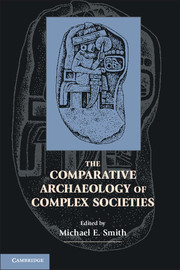Book contents
- Frontmatter
- Contents
- Tables
- Figures
- Contributors
- Foreword
- Preface
- Chapter 1 Comparative Archaeology
- Chapter 2 Approaches to Comparative Analysis in Archaeology
- Chapter 3 Comparative Frames for the Diachronic Analysis of Complex Societies
- Chapter 4 What It Takes to Get Complex
- Chapter 5 Challenges for Comparative Study of Early Complex Societies
- Chapter 6 Patterned Variation in Regional Trajectories of Community Growth
- Chapter 7 The Genesis of Monuments in Island Societies
- Chapter 8 Power and Legitimation
- Chapter 9 The Strategies of Provincials in Empires
- Chapter 10 Household Economies under the Aztec and Inka Empires
- Chapter 11 Low-Density, Agrarian-Based Urbanism
- Chapter 12 Archaeology, Early Complex Societies, and Comparative Social Science History
- Index
- References
Chapter 2 - Approaches to Comparative Analysis in Archaeology
Published online by Cambridge University Press: 07 October 2011
- Frontmatter
- Contents
- Tables
- Figures
- Contributors
- Foreword
- Preface
- Chapter 1 Comparative Archaeology
- Chapter 2 Approaches to Comparative Analysis in Archaeology
- Chapter 3 Comparative Frames for the Diachronic Analysis of Complex Societies
- Chapter 4 What It Takes to Get Complex
- Chapter 5 Challenges for Comparative Study of Early Complex Societies
- Chapter 6 Patterned Variation in Regional Trajectories of Community Growth
- Chapter 7 The Genesis of Monuments in Island Societies
- Chapter 8 Power and Legitimation
- Chapter 9 The Strategies of Provincials in Empires
- Chapter 10 Household Economies under the Aztec and Inka Empires
- Chapter 11 Low-Density, Agrarian-Based Urbanism
- Chapter 12 Archaeology, Early Complex Societies, and Comparative Social Science History
- Index
- References
Summary
Archaeology is inherently comparative. Comparison is necessary to understand the material record, for one cannot identify or understand an object never before seen without comparing it to a known object. Comparison is also necessary to understand variation over time and space, for one cannot identify or investigate variation unless one has examples spanning a range of variation, nor can one examine change without examples spanning a range of time. Comparative analysis is the only way to identify regularities in human behavior, and it is also the only way to identify unique features of human societies. Indeed, to Bruce G. Trigger the comparative nature of archaeological data and analysis places archaeology at the heart of the most important issues in the social sciences:
The most important issue confronting the social sciences is the extent to which human behavior is shaped by factors that operate cross-culturally as opposed to factors that are unique to particular cultures. (Trigger 2003:3)
In this chapter we outline the ways archaeologists have used comparison to understand the material record and to explore variation over time and space. After a brief history of comparative research on ancient societies, we review the variety of approaches used by the authors of this volume using seven dimensions of the comparative method in archaeology.
- Type
- Chapter
- Information
- The Comparative Archaeology of Complex Societies , pp. 4 - 20Publisher: Cambridge University PressPrint publication year: 2011
References
- 10
- Cited by



